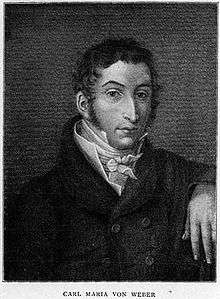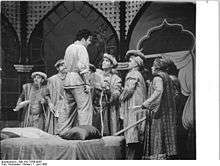Abu Hassan
| Carl Maria von Weber |
|---|
 |
|
Operas
|
Abu Hassan is a comic opera in one act by Carl Maria von Weber to a German libretto by Franz Carl Hiemer, based on a story in One Thousand and One Nights. It was composed between 11 August 1810 and 12 January 1811 and has set numbers with recitative and spoken dialogue. The work is a Singspiel in the then popular Turkish style.
Performance history
Abu Hassan was first performed at the Residenz Theater in Munich on 4 June 1811, under Peter Winter. In London, it was produced in English at Theatre Royal, Drury Lane in 1835, and in Italian at Drury Lane on 12 May 1870 (at the same time as Mozart's L'oca del Cairo), the translation being made by Salvatore Marchesi, and the dialogue set to recitative by Luigi Arditi.
Abu Hassan is not now part of the commonly performed operatic repertory, though it is sometimes staged. The overture is, however, well known and has been recorded separately many times.
Roles
| Role | Voice type | Premiere cast, 4 June 1811 (Conductor: Peter Winter) |
|---|---|---|
| Abu Hassan, cup-bearer to the Caliph | tenor | Georg Mittermaier |
| Fatime, his wife | soprano | Josefa Flerk |
| Omar, a money-lender | bass | Aloys Muck |
| Caliph | spoken | |
| Zobeide, the Caliph's wife | spoken |
Synopsis

Abu Hassan, a favorite of the Caliph of Baghdad, is heavily in debt. To retrieve his fortunes, he sends his wife Fatima to the Caliph's wife, Zobeide, to announce his (Hassan's) death, for which Fatima will receive 50 pieces of gold and a piece of brocade. After Fatima has set off, creditors enter Abu Hassan's house to collect money. Omar, the richest creditor, is tricked into believing that Fatima has spoken to him of love, so he agrees to pay all the other creditors.
Fatima returns with the presents from Zobeide. Abu Hassan now goes to visit the Caliph, intending to try a similar story about his wife and get money from him. While he is out, Omar reappears and demands a kiss from Fatima, but Abu Hassan returns. Omar hides in an adjoining room, and the husband and wife enjoy his fear of being discovered.
Now Mesrur, a messenger from the Caliph, arrives, to see if Fatima really is dead. Both the Caliph and his wife want to know who it was who died, and if both, who died first. Mesrur, seeing Fatima lying on the divan, her husband in apparent distress at her side, runs back to tell the Caliph. He has only just gone, when Zobeide's nurse runs in on a similar errand. This time it is Hassan who feigns death, while Fatima is all tears and lamenting.
Finally the Caliph and his wife are announced. Hassan and Fatima throw themselves on the divan, covering themselves, as if dead. The Caliph now offers 1,000 gold pieces to anyone who will tell him which of them died first. Hassan revives and throws himself at the Caliph's feet, saying "It was me - I died first!" He asks for a pardon, as well as the gold. Fatima does likewise, and the Caliph pardons them both. Omar, having paid off Hassan's debts in the hope of winning Fatima's heart, is sent away in disgrace.
Recordings
The opera has been recorded by Wolfgang Sawallisch, Leopold Ludwig, Gustav Kuhn and Gennady Rozhdestvensky, the last in Russian. A recording by Heinz Rögner with the Staatskapelle Dresden features Ingeborg Hallstein, Peter Schreier and Theo Adam (RCA Classic / Sony BMG). Cappella Coloniensis, conducted by Bruno Weil, recorded it in 2003.[1]
References
Notes
- ↑ "Capella Coloniensis Tonträger" (in German, accessed 24 February 2009.)
Sources
- Amadeus Almanac, accessed 7 October 2008
- Grove Dictionary of Music and Musicians, second edition
- Holden, Amanda, (ed.), The New Penguin Opera Guide, New York: Penguin Putnam, Inc., 2001 ISBN 0-14-029312-4
External links
| Wikimedia Commons has media related to Abu Hassan. |
- Abu Hassan: Scores at the International Music Score Library Project
- Details, libretto (German)
- Abu Hassan synopsis from Naxos Records
- Abu Hassan plot summary and character descriptions from StageAgent.com